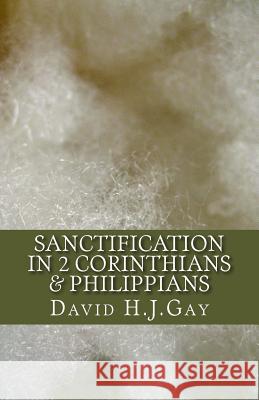Sanctification in 2 Corinthians & Philippians » książka
Sanctification in 2 Corinthians & Philippians
ISBN-13: 9781490432489 / Angielski / Miękka / 2013 / 32 str.
John Calvin inherited the doctrines of the medieval Roman Church. In particular, he inherited that Church's view of the law of God, given to Israel through Moses on Sinai. Calvin took the Church's teaching on this, as it had been developed by Thomas Aquinas, and tweaked it to produce a Reformed threefold-use of the law in the new covenant. Some Anabaptists and others resisted him at the time, but they were heavily out-gunned, and Calvin's system has dominated the Reformed and evangelical world ever since. Millions, who have never read a word of Calvin, many of whom would shudder at the very mention of his name, nevertheless, are, on the law, Calvinists - even though they may not know it. David Gay contends that Calvin was wrong on the law, and this has had serious consequences. Gay is concerned, in particular, with the Reformer's third use of the law - which is, said Calvin, to sanctify the believer. Gay disagrees. In his book, 'Christ is All', he probed Calvin's system, exposed it to the light of Scripture, and showed where it departed from the New Testament. He also demonstrated the utter inadequacy of the escape routes used by the Reformed to get round awkward passages of Scripture. Turning from the negative, Gay then looked at every major New Testament passage dealing with the believer and the law. Next, he set out scriptural teaching on the true way of sanctification for the believer. This, he showed, is not by the law of Moses; rather, it is by the law of Christ in the hands of the Holy Spirit. Indeed, as Gay made clear, the law of Christ is, ultimately, Christ himself. Hence his chosen title: 'Christ is All'. Having set out the believer's rule, he then answered seven objections levelled against it. This present volume, the third in the 'Brachus Sanctification Series', is Gay's chapters on 2 Corinthians and Philippians drawn from his 'Christ is All: No Sanctification by the Law', edited to enable them to stand on their own. Yet again, in 2 Corinthians 3 and Philippians 3, the apostle proclaims that sanctification is not by the law. Believers are not under the obsolete covenant of condemnation - that is, the law - but, he argues, in the new covenant under the law of Christ. More devastating blows to Calvin's threefold use of the law In publishing this work, Gay is making a key part of his argument on the law more widely accessible, and, at the same time, hoping to contribute to a right understanding of these vital portions of Scripture.
Zawartość książki może nie spełniać oczekiwań – reklamacje nie obejmują treści, która mogła nie być redakcyjnie ani merytorycznie opracowana.











